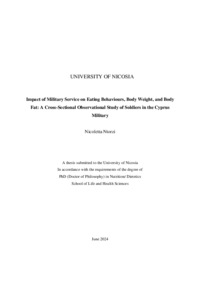- Ntorzi, Nicoletta
- Department of Life and Health Sciences
- 28 June 2024
- English
- 385 p.
- Papandreou, Demetrios | Vassilopoulou, Emilia | Andreou, Eleni
- Dietary Habits | Physical Activity | BMI | Weight Management | Military Hygiene | Food Supply | Armed Forces
- Armed Forces -- Food Supply -- Cyprus | Dietary Habits -- Armed Forces -- Cyprus
-
-
Background: The operational effectiveness of the Armed Forces is significantly influenced by the health and fitness of its personnel, which are affected by dietary habits and physical activity. Understanding these factors is crucial for developing effective training and nutrition programs.
Purpose: This study aims to evaluate the dietary habits, nutritional needs, and weight fluctuations of new recruits in the Cyprus Army across three phases of their service (0-6 months, 6-9 months, and 9- 12 months). The objective is to align these findings with the General Rule of Food Supply and Dietary Value (DV) guidelines of the Cyprus Armed Forces and propose necessary dietary modifications to prevent weight gain during military service.
Methods: Data were collected from 583 new recruits, including dietary preferences, physical activity levels, and personal metrics (age, height, weight, waist circumference, body composition), along with medical and dietary histories. Assessments were conducted at three key points: upon recruitment, six months later during basic combat training, and immediately before demobilization, twelve months after recruitment. A pilot study was also conducted to validate the methodology.
Results: The study found significant differences between the General Rule of Food Supply and Daily Values (DV) in the Cyprus Armed Forces and the National Dietary Guidelines for Adults. A notable outcome was the increase in body weight and Body Mass Index (BMI) among recruits, with a trend towards higher BMI categories indicating overweight status (p<0.0001). The mean BMI increased from 24.89 (SD = 4.12) in the first phase (0-6 months) to 26.01 (SD = 4.78) in the third phase (9-12 months). Similarly, the mean body fat percentage increased from 17.89% (SD = 6.45%) to 19.12% (SD = 6.89%) over the same periods. The study also observed that recruits generally failed to follow dietary guidelines before, during, and after their recruitment period.
Conclusion: The findings suggest that comprehensive dietary adjustments are required across the military command to optimize the nutritional status and health of soldiers. Implementing targeted interventions during the early months of service could promote healthy body composition and improve overall fitness levels.
-


